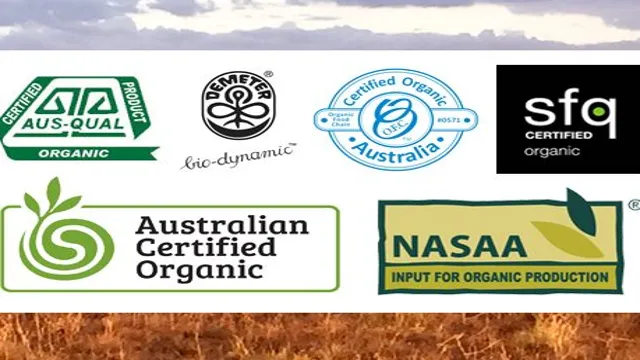In an era where sustainable living and responsible consumption have become the new norm, understanding the authenticity of organic products is essential. One crucial tool in that quest is Organic Certification Kits. These kits play a vital role in ensuring the organic integrity of products from farm to market.
However, not many consumers are aware of their existence or their importance. This blog post aims to shed light on these unsung heroes of organic authentication, focusing on their purpose, functionality, and benefits. We will delve into the world of organic certification, demystifying its complexities and untangling its importance in promoting a healthier and more sustainable lifestyle.
So whether you’re a conscious consumer, an organic farmer, or simply a curious reader, this guide will equip you with the knowledge you need to navigate the organic industry with confidence.
Table of Contents
What is Organic Certification?
Organic certification is a certification process for producers of organic food and other organic agricultural products. It is a verification system that ensures the organic integrity of products from the farm to the market. Organic certification allows a farm or processing facility to sell, label, and represent their products as organic.
The certification process involves a series of steps, including application, inspection, and review, to ensure that the product meets the stringent requirements of organic standards. Organic certification kits are integral to this process. They encompass the tools and resources necessary for a farm or processing facility to navigate through the organic certification process.
These kits are designed to simplify the often complex certification process, providing clear instructions and guidelines on how to meet the defined organic standards. They often include detailed information on organic farming practices, documentation forms for record-keeping, and guidelines on how to prepare for the inspection. By utilizing organic certification kits, producers can ensure they are adhering to the strict regulations and standards set forth for organic production.
This not only benefits the producer by allowing them to market and sell their products as organic, but it also gives consumers peace of mind knowing that the organic products they purchase are genuine and have been subjected to rigorous evaluation. In essence, organic certification is more than just a label. It’s a commitment to sustainable and ethical farming practices, and organic certification kits are the roadmap to achieving this important distinction.
Defining Organic Agriculture
Organic agriculture is a holistic farming approach that focuses on enhancing ecological balance, biodiversity, and soil biological activity. It strictly prohibits the use of synthetic pesticides, chemical fertilizers, genetically modified organisms, and antibiotics. Instead, it relies on techniques like crop rotation and animal manure to maintain soil health.
But how can you ensure that your farm adheres to these organic principles? Enter organic certification kits. These kits provide all the necessary tools and guidelines to help farmers transition from conventional farming to organic practices. Brimming with information and resources, they are like a road map to a sustainable and eco-friendly farming journey.

Importance of Organic Certification
Organic certification kits play a pivotal role in the agricultural sector, acting as a compass to guide farmers on the path of organic farming. These kits are not just a badge of honor but a testament to a farmer’s commitment to fostering a healthier planet. They ensure that the produce is free from harmful chemicals, grown sustainably, and maintains the integrity of the ecosystem.
With the organic certification kit, farmers can prove that they prioritize both the health of their consumers and the environment. Indeed, such kits are much more than a certification – they are a seal of trust.
Exploring Organic Certification Kits
Navigating the realm of organic certification can be a labyrinthine task, but thank goodness for organic certification kits. These kits are designed to simplify the process, providing a comprehensive set of tools and resources to guide both seasoned and budding organic farmers through the certification process. Organic certification kits are essentially your guide to understanding and complying with the rigorous standards set by the organic farming industry.
They are a treasure trove of information, offering detailed procedures, record-keeping systems, and even sample forms that can be crucial for your organic certification journey. These kits are not just about helping you get a certificate to hang on your wall. They are about ensuring you meet the very essence of organic farming – producing food in a way that is healthy, sustainable, and ethical.
The checklists and guidelines provided in these kits help farmers maintain the integrity of their land, reduce their environmental impact, and safeguard the health of consumers. In the grand scheme of things, organic certification kits are a small investment with potentially large returns. They can save you time, reduce stress, and prevent costly mistakes.
They are a testament to the old saying – knowledge is power. By equipping yourself with the right tools, you can navigate the organic certification process with confidence and ease. Ultimately, organic certification kits are more than just a box of paperwork.
They are a roadmap to a more sustainable and healthier future for our farms, our tables, and our planet. So, if you’re contemplating diving into the world of organic farming or looking to simplify the certification process, don’t overlook the value of a good organic certification kit.
| Feature | Description |
|---|---|
| Purpose | Organic Certification Kits are used to help farmers, growers, and producers achieve and maintain organic certification for their products. |
| Contents | Typically includes documentation templates, record-keeping tools, and guidelines for compliance with organic standards. May also include soil and product testing materials. |
| Certification Bodies | Kits are often designed to meet the requirements of various organic certification bodies such as USDA Organic, EU Organic, or local certifiers. |
| Documentation Templates | Forms for recording farm practices, crop rotations, and pesticide use. Helps maintain a comprehensive record of organic compliance. |
| Record-Keeping Tools | Tools for tracking inputs, outputs, and any non-organic substances used in farming or production. Essential for maintaining transparency and traceability. |
| Compliance Guidelines | Instruction manuals and guides on how to adhere to organic standards, including rules on soil management, pest control, and labeling. |
| Soil Testing Materials | Some kits may include soil testing kits to assess soil health and quality, ensuring compliance with organic soil management requirements. |
| Product Testing Materials | Kits may include testing materials for verifying the absence of synthetic chemicals or genetically modified organisms (GMOs) in products. |
| Cost | Prices vary depending on the contents and the certification body’s specific requirements. Typically range from $100 to $500 or more. |
| Benefits | – Streamlines the organic certification process. |
Components of an Organic Kit
Organic certification kits are the secret weapons for those seeking to delve into the realm of organic farming. These kits, equipped with essential tools and resources, are designed to streamline the usually daunting organic certification process. The primary components of these kits include comprehensive guidelines, application forms, crop management templates, and soil testing paraphernalia.
They may also provide sample record-keeping documents and pest management plans. These kits aim to demystify the certification process, offering a clear roadmap to achieving organic farming success. So, if you’re looking to wear the organic farming badge, an organic certification kit could be your guiding compass.
How to Use an Organic Certification Kit
Navigating the organic certification process can be a daunting task. Enter organic certification kits: your one-stop solution to this often complex procedure. These kits come equipped with the necessary tools and comprehensive guides to help you understand the standards, prepare your application, and maintain compliance post-certification.
They are essentially your roadmap to obtaining organic certification, demystifying the process with clear, step-by-step instructions. Plus, their cleverly designed structure saves you time and resources. So, if you’re pursuing an organic path, consider these kits your savvy sidekick, turning the intimidating into the achievable.

Process of Organic Certification
Navigating the Process of Organic Certification with Kits Embarking on the journey toward achieving organic certification can seem like a daunting task. The rules are stringent, the paperwork is boisterous, and the stakes are high. However, organic certification kits are designed to turn this labyrinthine process into a more manageable task.
These kits are like a survival guide, providing a comprehensive roadmap to help farmers, processors, and handlers navigate the often complex requirements of organic certification. They break down the process into digestible steps, offering essential tools and resources. Included within these kits are detailed instructions, necessary forms, and insightful tips to ensure compliance with the organic standards set by regulatory bodies.
Organic certification kits also act as an educational resource, providing a deeper understanding of the organic paradigm. They demystify the organic principles, translating the language of organic farming into practical, easy-to-implement actions. Ultimately, these kits are about more than just securing that coveted organic certification stamp.
They are about fostering a commitment to sustainable, responsible practices that respect our environment and promote healthier living. They are a testament to the belief that organic is not just a certification but a philosophy for life. So, if you’re standing on the precipice of the organic certification journey, don’t let the complexity deter you.
With an organic certification kit in hand, you’re well-equipped to conquer the process and join the ranks of certified organic producers.
Preparation for Certification
Navigating the path to organic certification can seem daunting, but with the right tools, it becomes a journey of transformation. Enter the realm of organic certification kits, your essential guide to achieving this important milestone. These kits aren’t merely a box of documents and checklists; they are a comprehensive roadmap, leading you through every twist and turn of the certification process.
Each kit is tailored to specific industry needs, providing resources, tips, and step-by-step instructions. With an organic certification kit in your arsenal, you’ll conquer the certification process with confidence and finesse, propelling your business into the thriving world of organic products.
Inspection and Verification
In the realm of organic produce, the phrase ‘trust but verify’ reigns supreme. Hence, the advent of organic certification kits. These kits serve as tangible proof of a product’s organic integrity, bridging the gap between consumer trust and product authenticity.
They represent the passport to credibility in the organic market, ensuring consumers that what they’re purchasing is genuinely organic. Without a doubt, organic certification kits are the unsung heroes, the silent sentinels in the ongoing quest for organic legitimacy. In essence, they’re the organic market’s version of the lie detector test – only a lot more reliable.
Benefits of Organic Certification
The Key to Unlocking the Benefits of Going Organic In the realm of agriculture and food production, organic certification is not merely a trendy buzzword but a symbol of quality assurance and environmental responsibility. It is a testament to a producer’s commitment to adhering to stringent organic standards, which encompass everything from soil quality to animal welfare. One of the most convenient ways to attain this coveted certification is through the use of organic certification kits.
These kits are designed to simplify the certification process, providing all the necessary tools and guidelines to ensure your farming or food production practices are in line with organic standards. The benefits of obtaining organic certification are manifold. Firstly, it can significantly boost the marketability of your products.
With the growing consumer consciousness towards health and sustainability, organic certification can set your products apart in a crowded marketplace. Secondly, organic farming promotes biodiversity and enhances soil health, which can lead to increased productivity in the long run. It also helps in the reduction of carbon emissions, contributing to climate change mitigation efforts.
Lastly, organic certification can be a source of pride and satisfaction. Knowing that you are contributing to a more sustainable and healthier world can be immensely gratifying. In a nutshell, organic certification kits can be your stepping stone towards a greener and more prosperous future.
So, take that leap of faith and embark on your organic journey today!
Consumer Trust and Loyalty
The ever-growing consciousness among consumers regarding environmental sustainability and healthy lifestyle choices has significantly boosted the demand for organic products. However, building trust in this sector is no easy task. Enter organic certification kits, an ingenious solution that helps businesses authenticate their organic claims and secure consumer loyalty.
These kits not only validate the organic integrity of products but also offer a transparent insight into the production process. They serve as a bridge of trust between consumers and brands, fostering loyalty and driving sustainable growth. It’s a win-win for both parties as consumers get assurance, and businesses gain credibility.
Market Opportunities and Profitability
Organic certification kits are an emerging market trend, offering immense profitability potential for businesses. These kits provide a comprehensive roadmap for growers aiming to transition into organic farming, ensuring compliance with stringent organic standards. The rising consumer demand for organic produce, coupled with an increasing interest in sustainable farming practices, sets the stage for a promising market.
In a nutshell, organic certification kits are not just a tool for farmers; they are a gateway to a lucrative, eco-conscious business venture ripe with opportunities.
Conclusion
Organic certification kits are not just a trend or a fancy label. They are the gatekeepers of authenticity in the world of organic products. They ensure that the food we eat, the clothes we wear, or the cosmetics we use are genuinely organic, free from harmful chemicals, and sustainably sourced. These kits are like detectives, meticulously examining and verifying that each step of the production process adheres to organic standards.
Frequently Asked Questions [FAQs]
1. Can anyone use organic certification kits?
Yes, anyone interested in obtaining organic certification can use these kits. They are particularly useful for farmers, gardeners, or food businesses who want to certify their products as organic.
2. Where can I purchase an organic certification kit?
Organic certification kits can be found on various online platforms, such as Amazon and eBay, and websites dedicated to organic farming and food production. It’s important to verify the credibility of the source to ensure the kit is up-to-date and comprehensive.
3. Are there specific organic certification kits for different types of farms or products?
Yes, there are specific kits tailored for different types of farms (like dairy, poultry, crop, etc.) and products (like processed foods, cosmetics, textiles, etc.) Each kit is designed to guide you through the specific regulations and requirements relevant to your type of organic operation.
4. How much does an organic certification kit cost?
The cost of organic certification kits can vary depending on the comprehensiveness of the information provided, the type of farm or product it’s designed for, and the source. It’s recommended to do some research and compare prices to find a kit that suits your budget and needs.

Leave a Reply